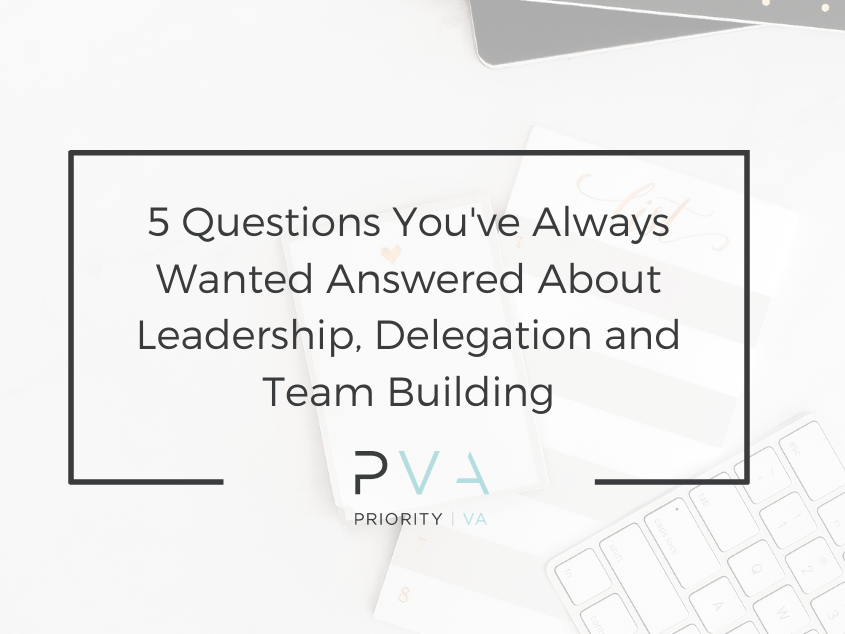In the late 19th century, a French military leader and strategist named Ferdinand Foch created the concept of “mission command.”
Mission command is a style of leadership that focuses more on empowering your team to make decisions rather than making all the decisions themselves.
Your ability to delegate work, trust your teammates to do their jobs well and communicate clearly with them will help you create an effective mission-command environment in which everyone works together towards a common goal.
Pulling this all together takes hard work, intentionality — and most importantly — support. Our clients who accept this challenge to build an empowered team need help and come to us with a lot of questions.
Here are our 5 most frequently asked questions about leadership, delegation and team building.
1. I am not a natural-born leader. How do I learn to lead while building my business too?
Despite common assumptions, leadership is a learned skill. We believe every business owner can be a leader if they choose to be.
There are many skills we don’t come into the world naturally knowing how to do — walking or eating solid food are two great examples of this!
Developing leadership skills involves looking at yourself and finding out where you excel and where you need to improve. Surveying peers in your network is a great way to get honest feedback on yourself. You can also connect with a mastermind, read leadership books and listen to podcasts to up your game.
If you don’t feel like a natural-born leader, lead yourself first. Make your bed every day. Implement a morning routine so you can show up to work with a clear mind. The more you learn to lead yourself, the better your interactions will be with others.
2. How do I stay focused on my strategic goals while keeping up with trends and customer needs?
As a leader and a visionary, there is always a pull between remaining accountable to your existing goals and casting vision for the future. It can be hard to stay focused on your present objectives — especially when there are so many new, buzzing trends in the community.
Our best advice is to stay connected to trends, but to filter your ideas through trusted forms of accountability. These can be peers in your community or team members. They can be the ones to tell you if an idea you’re chasing is a shiny object, or something that will truly help you serve your customer or grow as a business.
At the end of the day, no matter what trend or idea you’re entertaining, your customers must remain the priority. For this reason, we encourage entrepreneurs to implement something like the EOS system to make sure the most important stuff actually gets done.
Related: 3 Ways An EA Can Help You Achieve Your Big Goals
3. How do I build a culture that people will want to be a part of?
Well, it all starts with YOU!
If you want your team members to show up on time, always hit deadlines and take accountability for their words…you need to be a healthy example of those qualities too.
Conversely, if you are late every morning and never meet your obligations, no one will want to follow in your footsteps.
We always say that culture starts before you even have a team because culture is a reflection of how YOU show up.
You can’t be who you’re not. I’ve worked at plenty of places where I was a fish out of water, and it’s tough to thrive in an environment that doesn’t suit your personality.
To remedy this, we should always advertise our values so that people know what they are getting themselves into when they join the company.
This is especially true for those working remotely or part-time because there will never be any face-to-face communication for them to get a sense of personality fit from the team members.
4. How does someone learn how to delegate, especially if they are a control freak?
The most important thing is to set realistic goals for yourself, your EA and your team.
If you’re new to delegation, don’t expect yourself to relinquish control all at once. Choose one thing to delegate to your EA, like email or calendar management. Once your EA is meeting your expectations, give them a little bit more. Then a little bit more.
Remember, the goal, according to 19th century French military leadership, is “effective mission command” based on an empowered team. You can make all the decisions and do everything yourself, but how sustainable is that long term? How long can you operate as a control freak before you burn out or experience decision fatigue?
Give your team members the frame, the parameters for success. Document your SOPs. Then, let them own their role and perform within your boundaries. Expect that some things will go wrong. It won’t be done perfectly.
Related: How to Empower Your Virtual Executive Assistant
We think it’s better for work to get done to 80% of your standard by someone else, than for everything to be done 100% by you. (Plus, you can always push something over the finish line that final 20% if you absolutely must!)
5. Where do I find an EA, how do I vet them, how do I know if they’ll be a fit?
You can poll your network of friends or connections on social media or advertise on a website that you’re hiring.
Or, you can use a trusted service like Priority VA, which has benefits.
For one, using a service takes the pressure off of you. Conceptualizing your ideal candidate, crafting a magnetic job application, sorting through hundreds of resumes — yes, there will be hundreds, if not thousands — creating your short list, interviewing candidates and then further assessing hard and soft skills, is a MASSIVE investment of time, energy and money to hopefully attract a right-fit teammate.
Our passion is to save clients the headache by allowing us to do the heavy-lifting. Leaders should protect their time for what they do best — leading a team. In turn, let us do what we do best: presenting qualified candidates who are aligned with what you value and need.
Whatever method you use to hire, we recommend implementing a consistent hiring “gauntlet” to ensure proper vetting. We always advocate business owners hire (and fire) according to values to ensure a right-fit.





